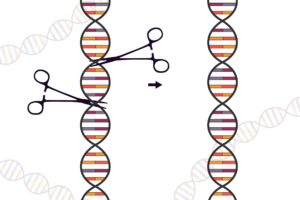First-ever systemically administered CRISPR therapy paves way for revolution in treatment of genetic disorders
Intellia Therapeutics and Regeneron Pharmaceuticals have presented positive interim data from an ongoing Phase 1 clinical study of their lead in vivo genome editing candidate, NTLA-2001, which is being developed as a single-dose treatment for transthyretin (ATTR) amyloidosis.
The Phase 1 study, run by Intellia, is evaluating NTLA-2001 in people living with hereditary transthyretin amyloidosis with polyneuropathy (ATTRv-PN). NTLA-2001 is the first CRISPR/Cas9-based therapy candidate to be administered systemically, via intravenous infusion, for precision editing of a gene in a target tissue in humans. NTLA-2001 is designed to inactivate the TTR gene in liver cells to prevent the production of misfolded transthyretin (TTR) protein, which accumulates in tissues throughout the body and causes the debilitating and often fatal complications of ATTR amyloidosis. The interim data were presented at the 2021 Peripheral Nerve Society (PNS) Annual Meeting and published in The New England Journal of Medicine.
These are the first ever clinical data suggesting that we can precisely edit target cells within the body to treat genetic disease with a single intravenous infusion of CRISPR
“These are the first ever clinical data suggesting that we can precisely edit target cells within the body to treat genetic disease with a single intravenous infusion of CRISPR. The interim results support our belief that NTLA-2001 has the potential to halt and reverse the devastating complications of ATTR amyloidosis with a single dose,” said Intellia President and Chief Executive Officer John Leonard, M.D. “Solving the challenge of targeted delivery of CRISPR/Cas9 to the liver, as we have with NTLA-2001, also unlocks the door to treating a wide array of other genetic diseases with our modular platform, and we intend to move quickly to advance and expand our pipeline. With these data, we believe we are truly opening a new era of medicine.”
The interim data cover the first six ATTRv-PN patients across two single-ascending dose cohorts of the Phase 1 study, which is being conducted in the United Kingdom and New Zealand. Single doses of either 0.1 mg/kg or 0.3 mg/kg of NTLA-2001 were administered systemically. Reductions in serum TTR levels were measured from baseline to day 28. Treatment with NTLA-2001 led to dose-dependent reductions in serum TTR, with mean reductions of 52% among the three patients in the 0.1 mg/kg dose group, and 87% among the three patients in the 0.3 mg/kg dose group, including one patient with a 96% reduction. By contrast, the standard of care for ATTRv-PN, which requires chronic treatment, typically yields TTR reductions of approximately 80%.
“This is exciting early data both for people living with this devastating disease and for the entire scientific community working to maximize the potential of genetics-based medicines through cutting-edge research and technologies,” said George D. Yancopoulos, M.D., Ph.D., President and Chief Scientific Officer of Regeneron, which first partnered with Intellia in 2016 to advance CRISPR/Cas9 gene-editing technology for in vivo therapeutic development.
“Thanks to large-scale human genetics research, there have been many new genetic targets identified and confirmed to have an impact on human health. Combining this knowledge with the precision and enhanced convenience of a single CRISPR infusion unlocks new possibilities in treating – and potentially even curing – life-threatening and historically difficult-to-address diseases.”
Well-tolerated
At both dose levels, NTLA-2001 was generally well-tolerated by the six patients included in the interim analysis, with no serious adverse events and no liver findings by day 28. Given the safety and tolerability profile so far, NTLA-2001 is continuing to be evaluated in the dose-escalation portion of the study, to determine if a higher dose could result in a deeper reduction in disease-causing protein levels leading to the potential for more meaningful clinical benefit.
Following the identification of a recommended dose in the doseescalation portion of the study, Intellia expects to begin a single-dose expansion cohort in Part 2 of the Phase 1 trial later this year. After completion of the Phase 1 trial, the company plans to move to pivotal studies for both polyneuropathy and cardiomyopathy manifestations of ATTR amyloidosis.
The NTLA-2001 clinical programme
The global Phase 1 trial is an open-label, multi-centre, two-part study of NTLA-2001 in adults with hereditary transthyretin amyloidosis with polyneuropathy (ATTRv-PN). The trial’s primary objectives are to assess the safety, tolerability, pharmacokinetics and pharmacodynamics of NTLA-2001. Patients receive a single dose of NTLA-2001 via intravenous administration.
Reference
1. Gillmore JD, Gane E, Taubel J, et al. CRISPR /Cas9 In Vivo Gene Editing
for Transthyretin Amyloidosis. N Engl J Med 2021. nejm.org/doi/
full/10.1056/NEJMoa2107454


